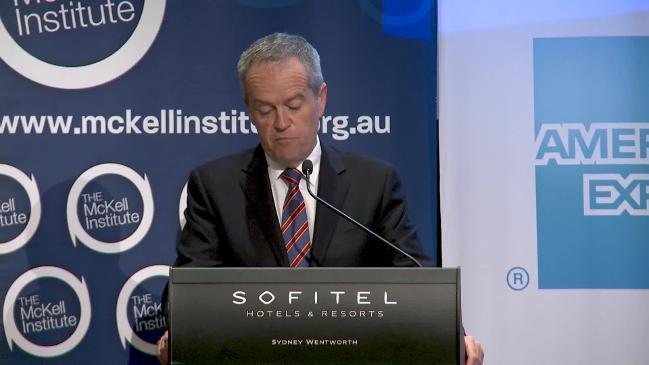Hayne commission into banking, superannuation and financial services is set to change industry
ROYAL Commissions have a rotten record but the Hayne commission into banking, superannuation and the financial services industry is set to change their image if there are real results which go beyond naming and shaming.

Opinion
Don't miss out on the headlines from Opinion. Followed categories will be added to My News.
ROYAL Commissions have a rotten record but the Hayne commission into banking, superannuation and the financial services industry is set to change their image if there are real results which go beyond naming and shaming.
Solid jail terms, banishment from future board positions, and prohibition from any involvement in the three areas will be needed to cleanse these industries from the venality clearly evident.
To be perfectly clear venality is the quality of being open to bribery and being openly motivated by money which Commissioner Ken Hayne and his team of incisive counsel most ably led by Rowena Orr QC have firmly established.
But while the major banks have been well and truly shamed in the short term, unless the commission is given an extension beyond its current February 1, 2019, deadline for its final report, and unless the government shows a greater commitment than it has, it will all amount to very little.
The commission’s terms of reference are very clear, it cannot resolve individual disputes, it cannot fix or award compensation or make orders requiring a party to a dispute to take or not to take any action.
Those who suffered from the collapse of Alan Bond’s house-of-cards corporation and endured the 1992 royal commission into WA Inc, Western Australia’s Burke Labor government’s engagement with Bond, received nothing. Similarly, there were royal commissions into two other state Labor governments’ financial failures, the 1990-92 inquiry into the collapse of the Tricontinental group of companies in Victoria and the 1991-93 inquiry into the collapse of the State Bank of South Australia, which left those principally responsible unscathed. The Turnbull government’s steadfast reluctance to appoint the royal commission is well known.
What could have been a plus for a struggling administration will now be a constant reminder of its lack of understanding of those whom the respected Liberal prime minister John Howard relied upon for his 1996 victory — the mortgage belt voters dubbed Howard’s battlers.
Prime Minister Malcolm Turnbull again demonstrated his tin ear and lack of empathy when he finally acknowledged his tardiness in recognising the need for the banking royal commission saying the government “would have had less political grief if it had set up a royal commission two years ago”. Most victims of the banks’ greed and corruption wouldn’t find much empathy in that statement.

Turnbull’s political grief is not their worry. They are concerned about the hard-won cash they’ve lost to the avaricious bankers and investment advisers. Turnbull and his inadequate Revenue and Financial Services Minister Kelly O’Dwyer may argue that reforms already undertaken by the government over the past two years include greater powers and resources for the regulators, the introduction of Banking Executive Accountability Regime, minimum annual grilling of bank bosses by Parliament’s House Economics Committee, stiffer fines and jail terms for breaches of the Corporations Act, and a one-stop shop complaints mechanism for customers.
Cold comfort though for those who’ve lost their homes and farms and businesses only to watch those on the boards overseeing the banks receive hundreds of thousands of dollars in fees and the executives who ran the operations receive millions in payments and bonuses. It’s not as if this disgraceful behaviour is anything new. Under former NAB bosses Don Argus and Frank Cicutto, the bank wrote off $4 billion in 2001 after a dreadful investment in the US-based HomeSide and the three NAB executives who took the blame walked away with $8.3 million in termination payments while their replacements were given bonus payments of about $7 million for successfully overseeing the sale of the failed company’s operating assets — for barely three months’ work.
A chummy arrangement which suited the bank but cost its shareholders millions.
The true heroes — outside those now grilling the bankers and financial advisers — are those who fought for the establishment of the royal commission and foremost is Fairfax journalist Adele Ferguson who put her work before NSW National Party senator John “Wacka” Williams.
To avoid any charges of conflict of interest I’ll happily disclose that both are friends and that I gave Ferguson her first job in journalism 20 years ago at The Adelaide Advertiser. “Wacka” and Adele showed the empathy with those who were being ripped off by the voracious banking and finance industries that the government lacked.
In 2015, the senator crossed the floor to support a Greens motion calling for a banking royal commission — that’s commitment. That it was defeated 39-14 shows how out of touch both Labor and the conservative parties were then.
Only a wholesale clean-out of the boards and senior management will begin to remedy the problem in the banking and financial institutions. Piecemeal solutions will just not do. For decades the big corporates have been playing to the idiots in the marketplace with statements about diversity and inclusiveness, their executives have queued to have their photographs taken at showy public events to indicate their support for social concerns, homosexual marriage, homelessness, the gender fluid population, but lost in all of this virtue signalling has been any regard for the one crucial element of character: integrity.
When a victim of the banking or finance industry has been ripped off they really couldn’t care less how many female or transsexual board members an institution has, all they want to know is that their money is being treated with respect and that their interests are being placed first.
There seems no doubt that the corporate watchdog ASIC failed its duty and former ASIC chief Greg Medcraft must be called to explain what went wrong on his watch.
The banks have used and abused our money and our trust. Their sound financial footing is owed in a large part to the government guarantees that taxpayers underwrite — it’s high time they recognised the debt they owe us.
